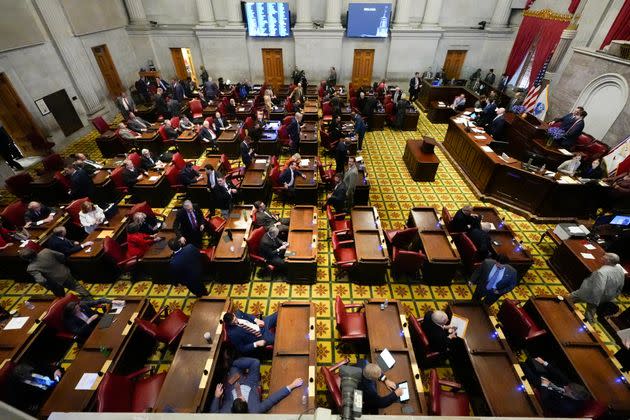Tennessee GOP Takes First Step To Roll Back Local Police Reforms

The Tennessee House of Representatives passed a bill Thursday to strip local governments of their ability to enact police reform measures, which would in effect roll back significant efforts made in Memphis last year following the high-profile death of 29-year-old Tyre Nichols at the hands of police.
House Bill 1931 aims to prohibit local governments in Tennessee from approving ordinances that could bring change to police department practices.
State Rep. John Gillespie and Sen. Brent Taylor, Republicans who represent parts of the Memphis area, sponsored the controversial legislation in their chambers. It passed the House with 68 “yes” votes and 24 “no” votes.
The legislation will now go to the state Senate.
Democratic state Rep. Justin Pearson, whose district includes parts of Memphis, told HuffPost that the bill’s passage in the House undermines efforts made by people looking to bring change to the city they live in.
“The implications of this decision hurt any efforts of the process of local communities,” Pearson told HuffPost. “We believe in a democracy, which means a belief in people to govern themselves, a belief for people to pass laws.”
Rodney Wells, Nichols’ stepfather, was outraged by the bill’s passage. He said that Gillespie told him and RowVaughn Wells, his wife and Nichols’ mother, that a final House vote would be tabled until later in the month and that their family could be present for it.
The family had attended a session for the bill Monday. But legislators delayed a vote on it without explanation, with Gillespie putting the legislation on the calendar for Thursday morning, when Nichols’ family was not in attendance.
“They lied to my face. It does not surprise me,” Wells told HuffPost in an interview.
“He [Gillespie] decided to tell us it would be next Thursday so we would not show up today. I do not like the MAGA Republicans, period,” he said, referring to followers of former President Donald Trump’s “Make America Great Again” movement. “You can’t trust them, not a word out their mouth. It does not surprise me that they did something like this.”
Speaking to The Tennessean, Gillespie denied that he misled Nichols’ family about the date for bringing the bill to a vote, describing it as a “miscommunication.”
Gillespie provided a statement to HuffPost following the passage of the bill in the House.
“My heart breaks for Tyre Nichols’ entire family,” Gillespie said in the statement. “They have lost a son, and they are in unimaginable pain. I have talked with them, and I hope to continue to keep an open dialogue. They were aware that this item would be on the calendar today. My No. 1 priority has always been to improve public safety and to make Memphis a safe city again.”
He added: “This legislation is about enforcing the state laws we already have on the books. No local government should be allowed to make any city less safe, nor should our law enforcement ever be put in the position of choosing which laws they should enforce.”
— Representative John Gillespie (@repgillespie) March 6, 2024
In 2023, the Memphis City Councilapproved the Driving Equality Act, an ordinance stemming from Nichols’ death earlier that year. It banned police from pulling over people for minor offenses, in an attempt to minimize confrontations between officers and residents in the city.
Memphis police officers, embattled police Chief Cerelyn Davis, and then-Mayor Jim Strickland (D) faced scrutiny after it was found that officers were not abiding by the standards set in ordinances passed by the City Council.
At the start of 2024, HuffPost talked with activists and criminal justice advocates who expressed major concern that little in local policing had changed since Nichols’ death.
“I could never in a million years imagine taking away legislation that removes a community’s power to protect themselves,” Pearson told HuffPost.
“But this Republican Party is willing to misuse and abuse their power to silence the voices of any community, any city, any constituency that they do not want to recognize as equal, as deserving of justice.”

